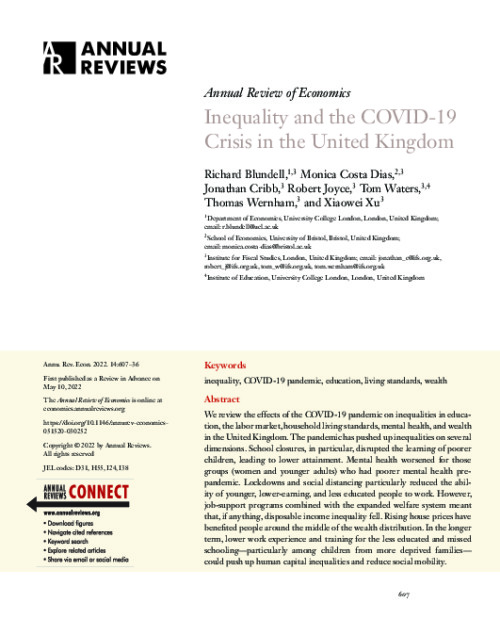Downloads
We review the effects of the COVID-19 pandemic on inequalities in education, the labour market, household living standards, mental health, and wealth in the United Kingdom. The pandemic has pushed up inequalities on several dimensions. School closures, in particular, disrupted the learning of poorer children, leading to lower attainment. Mental health worsened for those groups (women and younger adults) who had poorer mental health pre-pandemic. Lockdowns and social distancing particularly reduced the ability of younger, lower-earning, and less educated people to work. However, job-support programs combined with the expanded welfare system meant that, if anything, disposable income inequality fell. Rising house prices have benefited people around the middle of the wealth distribution. In the longer term, lower work experience and training for the less educated and missed schooling- particularly among children from more deprived families- could push up human capital inequalities and reduce social mobility.
Authors

CPP Co-Director
Richard is Co-Director of the Centre for the Microeconomic Analysis of Public Policy (CPP) and Senior Research Fellow at IFS.

Deputy Research Director
Monica is a Deputy Research Director and Professor of Economics at the University of Bristol, with an interest in Labour, Family and Public Economics.

Associate Director
Jonathan is an Associate Director and Head of Retirement, Savings and Ageing sector, focusing on pensions, savings and later-life economic activity.

Deputy Director
Robert is a Deputy Director. His work focuses on primarily on the labour market, income and wealth inequality, and the design of the welfare system.

Associate Director
Tom is an Associate Director at the IFS and Head of the Income, Work and Welfare sector.

Research Economist
Tom is a Research Economist in the Income, Work and Welfare sector, having joined the IFS in 2020.

Senior Research Economist
Xiaowei joined the IFS in 2018 and works in the Income, Work and Welfare sector.
Journal article details
- DOI
- 10.1146/annurev-economics-051520-030252
- Publisher
- Annual Reviews
- Issue
- Volume 14, May 2022, pages 607-636
Suggested citation
Blundell, R et al. (2022). 'Inequality and the COVID-19 crisis in the United Kingdom' 14(2022), pp.607–636.
More from IFS
Understand this issue

Council funding is a numbers game in which everybody is losing
13 May 2024

Empty defence spending promises are a shot in the dark
29 April 2024

Public investment: what you need to know
25 April 2024
Policy analysis

The past and future of UK health spending
14 May 2024

NHS spending has risen less quickly than was planned at the last election, despite the pandemic and record waiting lists
14 May 2024

Recent trends in and the outlook for health-related benefits
19 April 2024
Academic research
The employment and distributional impacts of nationwide minimum wage changes
10 April 2024

Willingness to pay for improved public education and public healthcare systems: the role of income mobility prospects
14 March 2024

Unfunded mandates and taxation
14 March 2024
